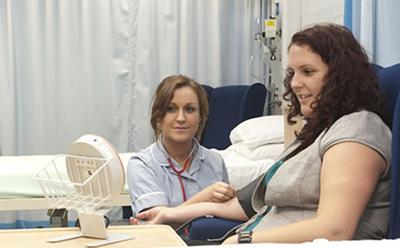Lower patient satisfaction in hospitals that employ more nurses trained abroad

Patient satisfaction is linked with the proportion of non-UK educated nurses providing care in English hospitals, a new Southampton study has shown.
Published in BMJ Open, the study shows that for every 10 per cent increase in the number of non-UK education nurses, there was a 12 per cent decrease in the likelihood of patients rating the hospital good or excellent.
The authors believe these findings provide important information for workforce planning in NHS hospitals.
There has been a long standing UK policy to turn to international nurse recruitment. Recent estimates show that one in 10 nurses in the UK is from another country, yet little is known about how such practices affect quality of care and patient satisfaction.
Professor Peter Griffiths, Chair of Health Services Research at the University of Southampton and a co-author of the study, comments: “National workforce planning in England has failed to consistently deliver enough trained nurses to work in the NHS. Relying on bringing in large numbers of foreign educated nurses to make up the shortfall is not a simple solution and may not be effective. Foreign educated nurses clearly need more support than they currently receive to adapt to work in the UK.”
The study, the first of its kind in the UK and a collaboration between the University of Southampton, the University of Pennsylvania and Kings College London, linked the data from 12,000 patients in 31 NHS trusts who completed the 2010 NHS Adult Inpatient Survey with nurse and hospital administrator surveys including the RN4CAST survey.
Non-UK educated nurses were self-identified from the survey as having received their basic professional nursing education in the country other than the UK. These countries included the Philippines and India and African and European countries.
The proportion of non-UK educated nurses varied by Trust from one to 52 per cent.
The study also showed that patients in hospitals with more nurses trained abroad were also less likely to report being treated with respect and dignity, getting easy to understand answers to their questions, and having the purpose of their medications explained.
As discussed in the paper, explanations for why worse patient experience is associated with nurses working in countries other than where they trained are not clear.
Professor Griffiths adds: “Our results show how important it is to invest in the domestic supply of nurses. It might be that hospitals who rely on large numbers of foreign educated nurses have other problems that means that they can’t attract and retain nurses, but we know that there are more qualified applicants than training places funded in England.”
Professor Anne Marie Rafferty, study co-author and of Kings College London, comments: “This study demonstrates that the yo-yo approach to nurse recruitment needs to stop and focus on producing enough well educated nurses to meet future demand and sustain quality in the system.”
Study co-author Professor Linda Aiken, of the University of Pennsylvania, adds: “The study was motivated by findings from a previously published U.S. study documenting higher mortality for patients in U.S. hospitals that employed non-U.S. educated nurses and evidence that NHS hospitals were increasing nurse recruitment abroad.”
The study was funded by the European Union’s 7th Framework and the US National Institute of Nursing Research, NIH.
Notes for editors
The RN4CAST study, conducted with a 3 million Euro grant from the European Commission with additional funding from the National Institute of Nursing Research of the National Institutes of Health in the U.S., investigated hospital quality and safety of care in Belgium, England, Finland, Ireland, Germany, Greece, Netherlands, Norway, , Poland, Spain, Sweden, Switzerland, and the U.S. Further information for country lead researchers can be found onwww.rn4cast.eu